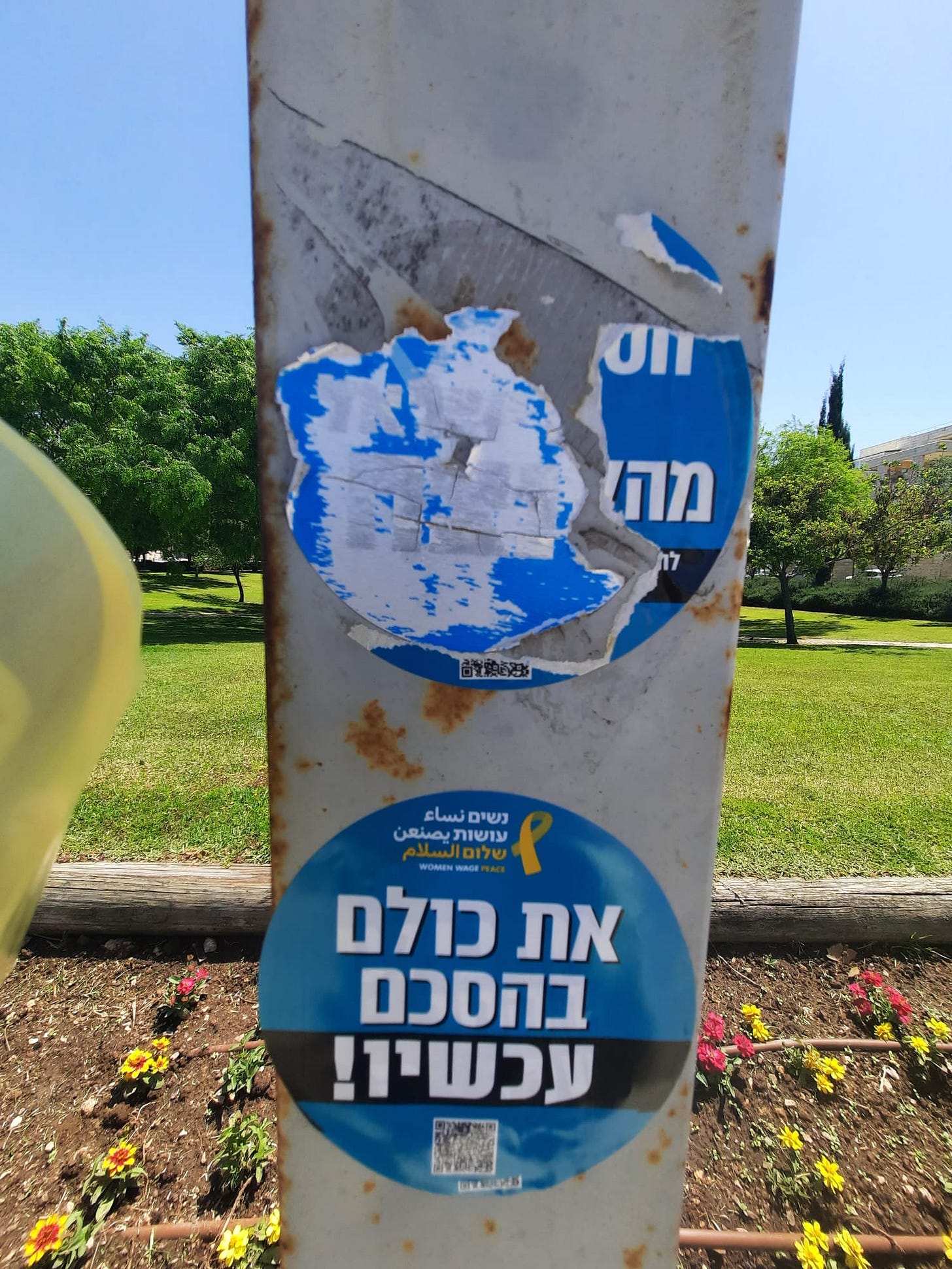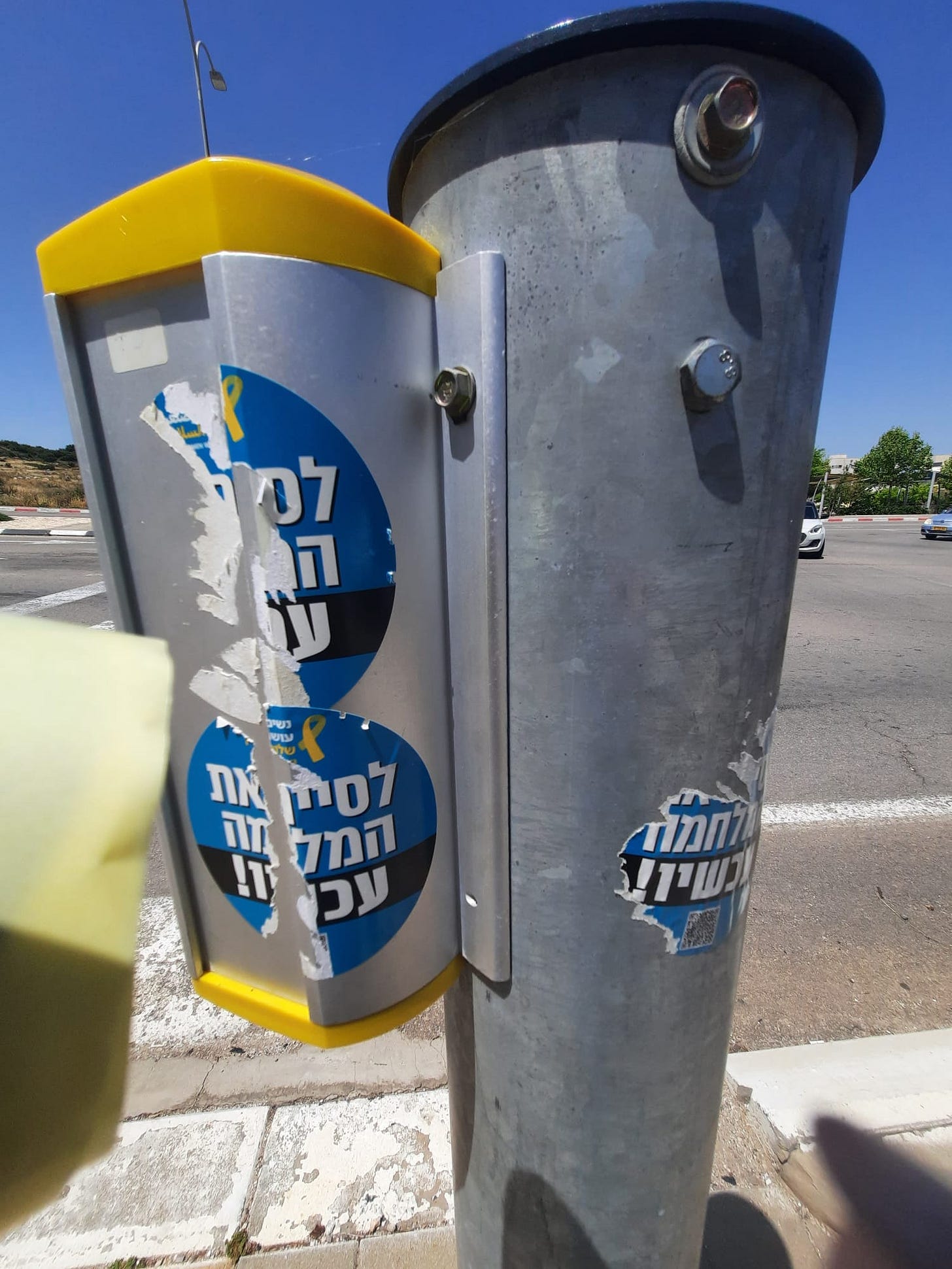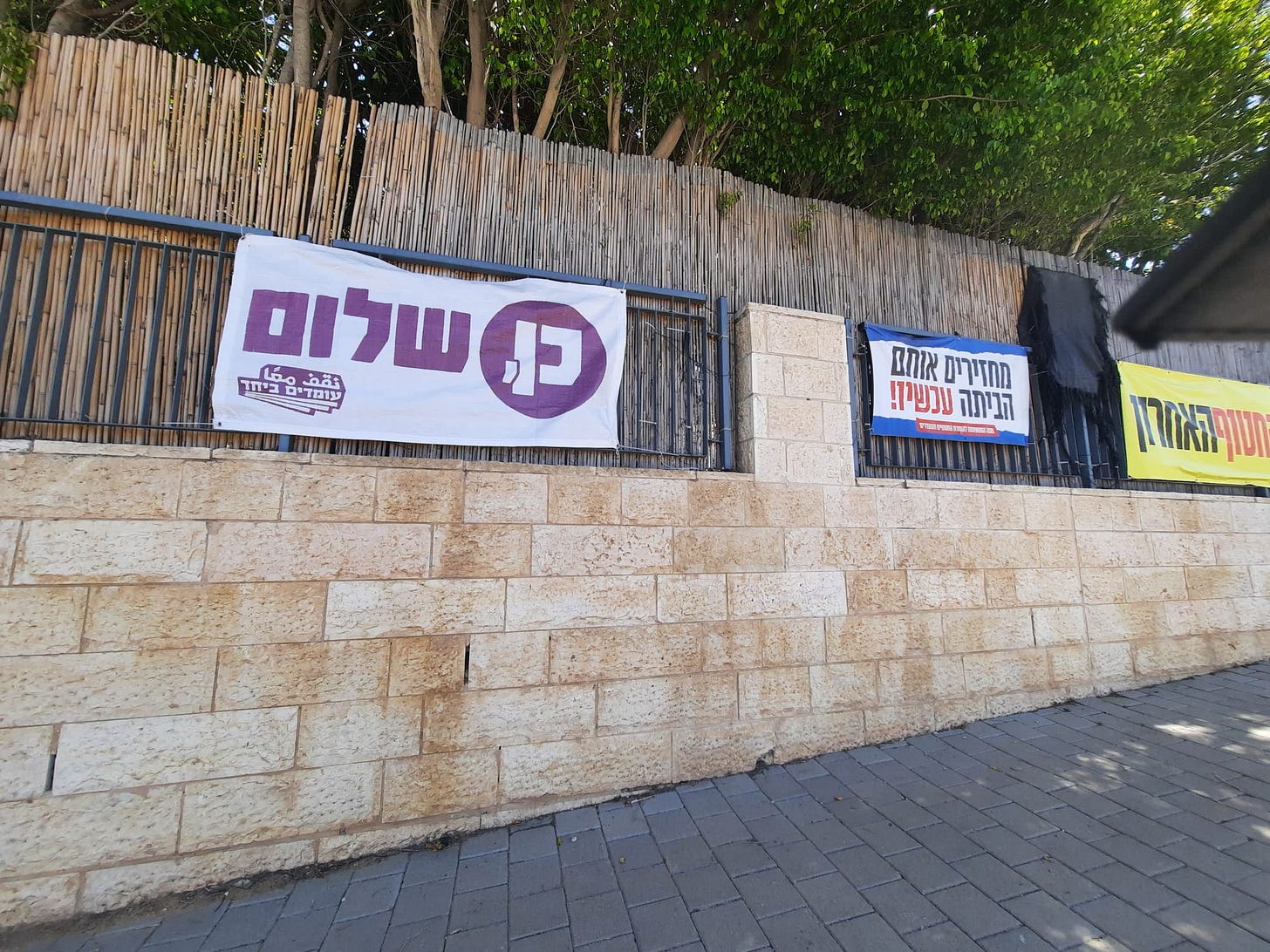Peace via stickers
Israeli society is engaged in a battle of public opinion about the war that takes place via stickers. I've picked up my own weapons along the way. Here's what happened.
Over the past few weeks, whenever I take my morning walk, I've been putting up stickers to end the war. The stickers, which my friend Nirit Oren Shternberg gave me after I interviewed her for my Women Ending War podcast, read, “End the War Now!” or “Bring all them back with a deal now!”
I have been putting these up because, amid the general feeling of helplessness in ending this war, this feels like one tiny thing I can do to maybe have an impact. I feel like, any opportunity I have to spread the idea that war can end, that this war must end, that there are options, that there are alternatives, that we have a moral obligation to end this war and all of this killing, any opportunity I have, I take. I believe in subliminal influence, that the more we see an idea around us, even if we're not fully paying attention to it, the more chance it has to enter our consciousness. So I feel like the more people see this idea that the war can and must end, the more the idea might actually start to enter people’s minds. They might start to believe it.
Still, this little task of putting up stickers around my neighborhood is not without its challenges. One challenge is that many of the stickers get pulled down. You can actually see where people have actively tried to pull them down. This morning I spent time replacing ones that have been purposefully ripped.
This one I put up on the door of the building’s garbage room just this morning on my out, and by the time I came back home, the bottom had already been actively ripped.
It's not just the stickers that come down. On the gate around my yard, which opens to a main street. I have a lot of posters. Most of the banners are about returning the hostages — the most recent addition is the yellow one on the right calling for ALL to be returned. The white and purple one on the left is calling for peace from the organization Standing Together. This is my fourth attempt to get one of Standing Together’s posters to stay up. All the other ones about hostages have stayed up, but the ones that I put up for Standing Together that call for shared society and peace, those get torn and cut and pull down all the time. First there will be a little cut, maybe the logo gets torn off, sometimes the Arabic letters get destroyed, until eventually one day the whole things is gone. But this one has been up for around two weeks now, so, you know, so far so good. Let’s hope it sticks, physically and metaphorically.
I think about this energy that it takes to pull down a sticker that say, end the war. It's an act of aggression and violence. It's a violent need to stop people trying to stop the war. It's a violent need to sustain violence that is very disturbing for me, very, very upsetting.
Moreover, it is a direct expression of what this Netanyahu/ Ben Gvir/ Smotrich government is projecting. It is a violent act of support for a government built on violence. It reflects the success with which this government has planted violence into the Israeli consciousness as something legitimate, necessary, and good. Endless violence as the Jewish way.
It’s infuriating. And frustrating. And of course, heartbreaking.
It's absolutely heartbreaking, because every day we're seeing real lives of Palestinians being destroyed in Gaza, babies, children, entire families being killed in the name of this violent need to promote violence or revenge or whatever that is.
Over the weekend, the IDF bombed tents of displaced families in the so-called “safe zone” in Khan Younis, killing 35 people including babies and children.
Also it's extremely heartbreaking for all the hostage families, because tied in with all of that are these non-stop messages that we get from the government that hostages will have to wait if at all. The government KNOWS that the hostages’ lives are being risked by IDF bombings, too, yet stopping is not on the government’s agenda. The hostage families this weekend said in increasing fury and frustration that the government has zero plan to return the hostages.
I put up these stickers calling for an end to all this, and yet the stickers face some very powerful forces of opposition. There are people in power who want this war to keep going, no matter what the cost. And they have support of people dedicated to that goal. They are everywhere.
****
There's another thing that I come up against, which is the sticker movement since the war in general. since October 7, Israelis have taken to using stickers, especially bumper stickers to memorialize the dead.
All over the country, there are walls full of stickers created by friends and family of soldiers killed or people killed on October 7, with photos of them and quotes of them that describe who they were.
So when I take my walks to put up my stickers calling for an end to the war war, I always come up against these walls full of the dead.
Until recently, I've avoided those walls in order to honor the dead. I don't want to interfere with people's need for mourning, very legitimate needs to grapple with trauma.
But this morning, I changed my mind a little bit, and I started to put my stickers up, even on walls of the mourning. I thought to myself, even here in this awful place of marking death, of remembering people who often died in battle, here, too, I want to scream out and say, “Enough! Enough! No more killing!”
This is tricky in Israel, because the pushback you get is, “What are you saying?! That these people died in vain, that they died for nothing?!”
As if somehow continuing the war will give their deaths some kind of meaning.
It’s not my place to question people's mourning processes. People coping with grief and loss are entitled to do whatever they need to do for themselves.
I would like to suggest, though, regarding Israeli culture in general, that perhaps we need to question the idea that the only way to respond to killing is with more killing. I would like us to question this almost an eye for an eye kind of thing, the idea that, well, look at all these people who died, therefore we need to continue the war in order to keep their names alive and in order to make their deaths meaningful.
It reminds me of this sign I saw, in which a mourning mother challenged the whole idea that “In death, they commanded us to….” whatever comes next in classic Israeli culture. She wrote, “In death, he commanded us nothing. He wanted to live.”
She was questioning this whole idea that army service and fighting in war create meaning. We need to revere life, not death. To fight for the right to live, not for the right to kill.
So I’m in this war over the consciousness of Israeli society. Via stickers. Whatever tools I have at my disposal. For peace.
####













